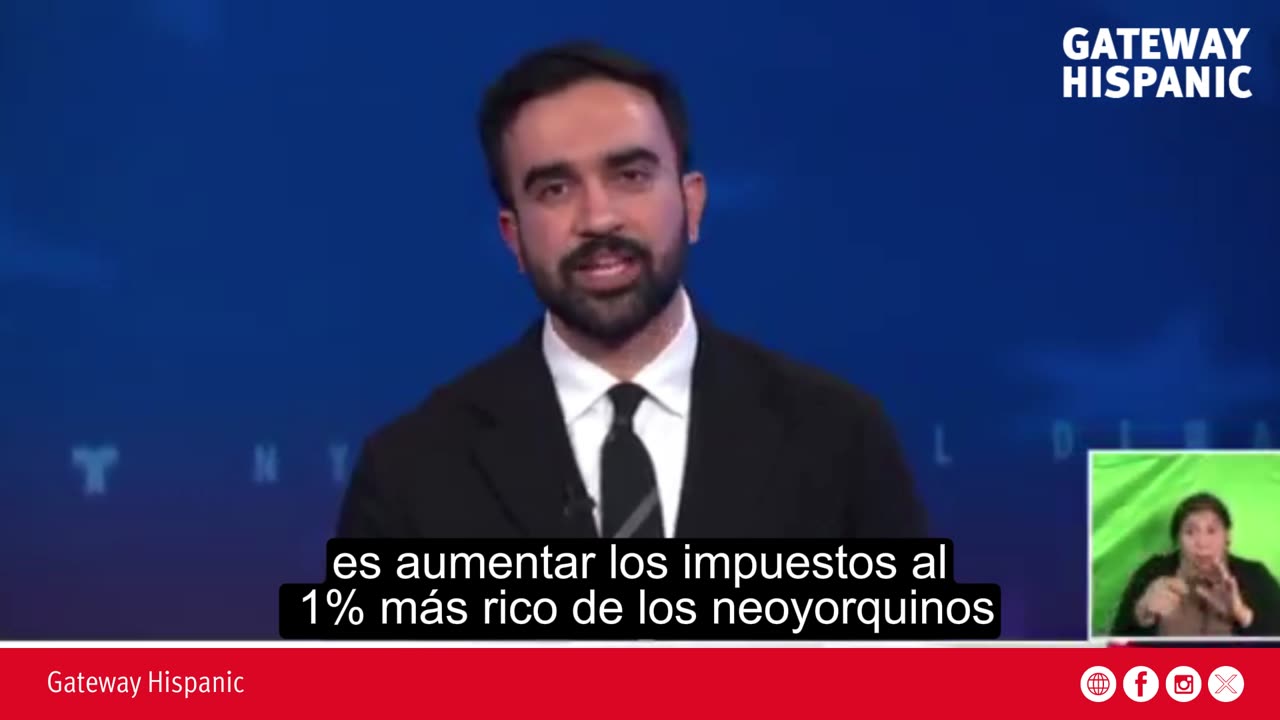Premium Only Content

Mamdani Proposes Tax Increases on the Wealthy and Corporations to Fund Free Services in New York
During the recent electoral debate in New York, Democratic candidate Zohran Mamdani presented his economic proposals focused on expanding free public services, including education and healthcare initiatives, funded through tax increases targeting both high-income individuals and corporations. Mamdani argued that the funds for these programs would come from fiscal redistribution, a measure he claims would cover the costs without relying on cuts to other essential services.
The candidate outlined two main strategies to generate the necessary resources. First, he proposed a 2% increase in income taxes for the top 1% of New Yorkers, expecting to raise approximately $4 billion. Second, he suggested raising the state’s highest corporate tax rate to match that of New Jersey, which he estimates could generate an additional $5 billion. Together, these measures would total $9 billion intended to fund the free services programs Mamdani advocates.
However, these proposals raise significant concerns. Increasing taxes on individuals and corporations could discourage investment, affect New York’s competitiveness, and create a financial burden that would indirectly fall on taxpayers, including those not in the top income brackets. Economic experience shows that tax hikes of this magnitude can have counterproductive effects on economic growth and job creation, especially in an urban context like New York City.
Critics also point out that the promise of “free” services ignores hidden costs and the long-term sustainability of such programs. Funding through higher taxes does not guarantee efficient resource management nor ensure that benefits reach all citizens equitably. From a Republican perspective, the solution to expanding services should focus on spending efficiency, incentives for private investment, and mechanisms that promote fiscal responsibility rather than relying on massive tax increases that could stifle the economy.
The debate over the feasibility of these proposals also presents an ethical and practical dilemma. While Mamdani frames tax increases as a form of social justice and wealth redistribution, opponents argue that such policies could deepen economic and social polarization by penalizing productivity and legitimate wealth creation. Additionally, focusing on raising large sums through progressive or corporate taxes may divert attention from deeper structural issues, such as government efficiency, corruption, and resource prioritization.
In conclusion, Zohran Mamdani’s proposals to tax the wealthiest and corporations to fund free services reflect a progressive leftist vision that seeks to redistribute resources through fiscal pressure. However, from a conservative and Republican viewpoint, these measures are risky, could slow investment and economic growth, and do not guarantee efficient management of public resources. New York faces complex challenges that require solutions fostering prosperity, security, and opportunity for all, without depending on tax increases that may create more problems than they solve.
-
 2:52:54
2:52:54
Barry Cunningham
4 hours agoMUST SEE: PRESIDENT TRUMP NATO PRESSER! AND NEW YORK CITY MAYORAL DEBATE!
29K36 -
 13:15
13:15
Cash Jordan
6 hours ago"INVASION" Mob STRIKES Chicago Jail… FRONTLINE Marines IGNORE Judge, SMASH Illegals
10.9K24 -
 LIVE
LIVE
SpartakusLIVE
3 hours ago#1 Solo Challenge CHAMPION entertains HERDS of NERDS
232 watching -
 LIVE
LIVE
Alex Zedra
2 hours agoLIVE! New Game | DeathWatchers
173 watching -
 DVR
DVR
Nikko Ortiz
3 hours agoShotguns With A Magazine... |Rumble Live
7.54K -
 23:18
23:18
Lady Decade
8 hours agoThe Diversity Lie Gaming Refuses To Talk About
7.3K4 -
 LIVE
LIVE
Geeks + Gamers
3 hours agoGeeks+Gamers Play- MARIO KART WORLD
151 watching -
 5:33:12
5:33:12
Midnight In The Mountains™
6 hours agoGaming w/ Midnight | Studio is BACK and SO ARE WE | 3 AWAY FROM 1,500 WILL YOU GET ME THERE?!
3.54K3 -
 1:51:13
1:51:13
Glenn Greenwald
7 hours agoTucker Carlson Speaks at Turning Point, Prompting Cheers and Controversy; More Evidence of Israeli Atrocities Amid Fragile Ceasefire; Tommy Robinson Submits to Re-Education in Israel | SYSTEM UPDATE #536
101K103 -
 3:14:42
3:14:42
SOLTEKGG
3 hours ago🔴LIVE - BATTLEFIELD 6 GIVEAWAY
1.53K